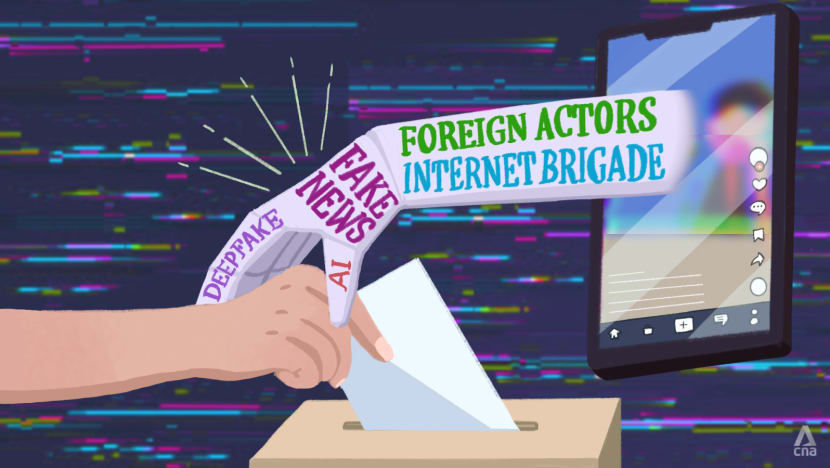Commentary: What Singapore can do more against rising threat of foreign interference
Citizens everywhere need deeper understanding and awareness of fast-evolving foreign interference tactics and techniques if they are to resist influence by foreign powers in their voting behaviour, says the Singapore Institute of International Affairs’ Nicholas Fang.

A multitude of online threats await political parties, authorities and the voting population as Singapore’s next general election looms. (Illustration: CNA/Clara Ho)

This audio is generated by an AI tool.
SINGAPORE: In the flurry of activity as Singapore gears up for a general election, attention is on political issues, potential candidates and contestation between the various parties.
As exciting as local contests might prove, the backdrop for any elections – in Singapore and elsewhere – includes a graver potential threat: Foreign interference.
Hopefully, this rising threat is not completely unheard of by most Singaporeans.
Singapore’s Ministry of Home Affairs (MHA) defines foreign interference as activities conducted by foreign actors, including foreign governments and organisations, that interfere in the politics and policies of a target country to advance the foreign actor's own interests.
Singapore’s Elections Department (ELD) warns that foreign interference is typically done through disinformation; amplifying false or inflammatory narratives via cyber armies, trolls or bots; the use of fake online identities; party or campaign financing; and the cultivation of political entities.
WILL WE KNOW IT WHEN WE SEE IT?
While this concept is nothing new in the history of the world, the challenge will be whether Singaporeans recognise it when we see it, given the full range and forms of the threat.
It helps to look at examples of countries targeted by interference from foreign sources.
Last December, the Romanian Constitutional Court annulled the first round of the country’s presidential election, on grounds of Russian interference. Declassified intelligence documents alleged a coordinated effort to boost a far-right Pro-Russia candidate, through illicit campaign funding and manipulation of TikTok algorithms. The candidate garnered a relative majority of votes.
Moldova accused Russia of “illegal and deliberate interference” in its November 2024 presidential election and referendum to inscribe European Union accession as a goal in its constitution. The Russian-friendly candidate was defeated by a slim margin, and Moldova narrowly voted in favour of EU membership.
In the lead-up to recent German election, public broadcaster DW gave examples of top candidates being targeted by disinformation efforts, such as false allegations of a mental breakdown and suicide attempt or a corruption scandal.
RISING THREAT OF FOREIGN INTERFERENCE
It is somewhat reassuring to note that Singapore has not been hit by overt examples of large-scale foreign interference campaigns.
But there is concern that the threat will intensify and spread more widely.
Technological evolution and the ubiquitous nature of digital and social media have opened up new fronts in the battle for hearts and minds. Disinformation campaigns leveraging on artificial intelligence and tools such as deepfakes have been the source for instability and disruption in different countries.
As the technology evolves, tactics and techniques of bad actors shift in tandem. This creates significant challenges for governments seeking to protect their institutions and societies from malign influence.
At the same time, the world is facing increased contestation, with two physical wars persisting in Europe and the Middle East, and a trade war brewing on the back of questionable policy decisions and the use of tariffs by the US.
With major powers seemingly on the precipice of outright conflict, globalisation and cooperation seem to be a distant consideration. The environment seems ripe for tactics such as foreign interference to grow in popularity as a means to get an edge over competitors.
SINGAPORE IS NOT IMMUNE
It would be foolhardy to think that Singapore is and always will be immune to threats of foreign interference.
As an open and relatively successful financial and economic hub, with outsized representation and leadership on various international fora, Singapore represents an attractive target for bad actors.
A variety of measures has been deployed to address such threats.
The Foreign Interference (Countermeasures) Act, or FICA, was enacted in 2021 and contains countermeasures to prevent, detect and disrupt foreign interference in Singapore's domestic politics.
The law was in the news recently when four members of one of Singapore's richest families were designated as "politically significant persons" for their membership to a China political advisory body. MHA had emphasised that the four individuals had not engaged in any “egregious activity”. As such, their designation can be seen as a pre-emptive move to guard against any potential vulnerabilities to foreign interference.
This is the second time MHA has announced its intention to designate individuals under FICA provisions, following Singaporean businessman Philip Chan Man Ping’s designation in February last year.
Also last year, FICA was invoked to block 95 social media accounts linked to self-exiled Chinese billionaire Guo Wengui, the first time that the account restrictions directions under FICA were being deployed.
MHA said the directions were issued after the network of accounts was found to have disseminated disinformation, which included allegations that Singapore is "in the pocket of a foreign actor", who was "behind the scenes in the selection of Singapore’s fourth-generation leader”.
A law was also passed in October last year to ban deepfakes and other digitally manipulated content of candidates, as part of online election advertising.
Beyond legislation, MHA had also recently launched an online campaign to raise awareness about what foreign interference can look like, and how technology can be used as tools by bad actors.
WHAT MORE CAN BE DONE
Legislation and awareness campaigns are important steps. But building a country’s resilience against foreign interference threats requires deeper efforts to be successful in the longer term.
For a start, we need to recognise that the nature of foreign interference is broad and constantly evolving with new tactics, techniques and procedures. As such, coming up with a framework and common vocabulary can ensure that different national agencies, international partners and citizens are aware of what exactly we are talking about when referring to such threats.
The European External Action Service, or the European Union’s diplomatic service, has pioneered development of the concept of Foreign Information Manipulation and Interference (FIMI).
FIMI aims to meld two adjacent threats – information operations and foreign interference – into a joint concept that can be tackled holistically. This makes sense given that disinformation is often used in foreign interference operations as an effective tool.
Other countries around the world could consider exploring concepts and frameworks such as FIMI in order to establish a common understanding and language that would enable more effective cross-border collaboration to tackle such threat.
As countries like Singapore, Canada and Australia gear up to go to the polls this year, citizens will need to arm themselves with the knowledge, information and awareness that will enable them to resist influence by foreign powers in their voting behaviour, and interference in our electoral processes.
One thing is clear: The threat of foreign interference represents a clear and present danger that all nations and their citizens need to be cognisant of. We all need to do our part to be ready to counter it.
Nicholas Fang is director for security and global affairs at independent think tank, the Singapore Institute of International Affairs. He is a former nominated member of parliament and founder and managing director of market research consultancy Black Dot Research which runs a leading independent fact-checking platform.



















